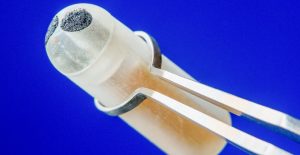 UC San Diego has created an experimental “smart pill” that continuously monitors the inside of the small intestine, work that could lead to better ways to spot and treat gastro-intestinal disorders, including inflammatory bowel disease and diabetes.
UC San Diego has created an experimental “smart pill” that continuously monitors the inside of the small intestine, work that could lead to better ways to spot and treat gastro-intestinal disorders, including inflammatory bowel disease and diabetes.
The inch-long, wireless biosensor was placed in pigs and successfully took real-time glucose readings for periods ranging from two to five hours, according to a paper UCSD just published in the journal Nature Communications. The data was relayed by the pill’s tiny antenna.
Researchers used pigs because their GI tract is similar to the one in humans.
The proof-of-concept work was conducted by engineers at UCSD’s Center for Wearable Sensors, which broadly works on health-related devices.
The researchers will now try to find ways to make the smart pill smaller so that it can be easily swallowed by humans. They’ll also make it capable of taking a greater variety of readings.
The sensor is meant to be an alternative to the endoscope — a long, thin tube with a camera that is typically threaded through a person’s mouth and throat, down into their digestive tract. It provides a limited, short-term look at a person’s condition.
“Right now, if you have a stomach problem (doctors) can take an X-ray but that’s not going to tell you much,” said Patrick Mercier, co-director of the Center for Wearable Sensors. “And they can do an ultrasound.
“But you can’t access the gut without doing an endoscopy, which means you have to put the patient under. They stick a tube all the way down. It’s very painful.
“This technology offers a really interesting new avenue to access this (relatively) inaccessible piece of the human body. We could adapt it to measure all sorts of things. If you had acid reflux we could measure the acid in your stomach in real-time.”
Read more about this in the San Diego Union Tribune, on KPBS, or UCSD News. The Nature Communications paper can be found as an open access article HERE.
